9 Best Cardano Wallets for 2023 - Compare Secure ADA Wallets
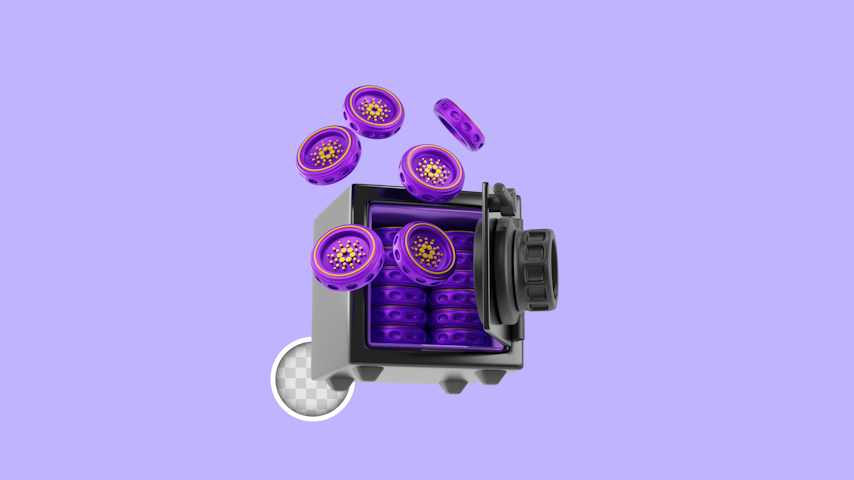
Currently invested in Cardano and looking for the best ADA wallet? Finding the right crypto wallet to suit your trading needs is easier said than done.
In this guide, we compare the best Cardano wallets for 2023. Discover the top ADA wallets for security, supported networks, device types, features, and more.
List of the Best Cardano Wallets for 2023
Let's get straight into it - here's a list of the best ADA wallets in the market right now:
- Best Wallet - Newly launched non-custodial wallet connects to the Ethereum, Polygon, and BSC mainnet, and will soon be compatible with Bitcoin and other networks. The platform offers token analysis and market insights, a registration-free DEX, and NFT capabilities.
- eToro - The eToro wallet is simple to use and is backed by a regulated brokerage. It supports ADA and 90 other cryptocurrencies, including Bitcoin, XRP, Dogecoin, and Solana. The eToro wallet can be accessed via web browsers and a mobile app. eToro also supports ADA staking, trading, and smart portfolios.
- Trust Wallet - Another great option is Trust Wallet, which offers free non-custodial wallets via an Android and iOS app. Web-based users can also download the Chrome extension. Trust Wallet supports the Cardano network, plus 70 other blockchain standards. The wallet comes with an in-built tool for staking and swapping ADA tokens.
- Trezor - Trezor is a hardware wallet that supports ADA and thousands of other cryptocurrencies. The wallet's private keys are never exposed to the internet, as the device is always offline. Depending on the chosen model, ADA transactions are confirmed via Bluetooth or a USB cable. Both options require users to enter a PIN on the device.
- Exodus - This non-custodial wallet can be downloaded as an app or desktop software. It comes with in-built staking tools, with ADA yielding 3.5%. Exodus also offers a portfolio management dashboard, which is great for long-term investors.
- Coinbase - Those looking for the best beginner-friendly Cardano wallet might consider Coinbase. While Coinbase is a centralized provider, it offers two-factor authentication, withdrawal locks, and KYC verification. Wallets connect to the Coinbase exchange for a seamless trading experience. Coinbase users can also stake ADA.
- Binance - Binance - the largest cryptocurrency exchange for trading volume, allows users to store Cardano via its web wallet. The Binance wallet comes packed with features, including trading, staking, and savings accounts. Binance also allows users to trade Cardano with leverage.
- Ledger - Another cold storage option for Cardano investors is Ledger. This hardware wallet provider has three devices to choose from, ranging from $79 to $279. Ledger is ideal for long-term Cardano investors that seek institutional-grade security.
- Daedalus - Daedalus is a full-node ADA wallet that connects directly to the Cardano blockchain. This option is aimed at developers that want to operate Cardano notes directly on their desktop device. Supported operating systems include Windows, Mac, and Linux
The above Cardano wallets list covers a variety of hot and cold storage options. Further down, we review each wallet provider in great detail.
The Basics of Cardano Wallets
ADA tokens, the native cryptocurrency of Cardano, are stored in wallets. Cardano wallets ensure investors safeguard their ADA tokens. Moreover, Cardano wallets allow investors to send and receive funds. Cardano wallets are available as software and hardware, with the former supporting both smartphones and desktops.
Cardano wallets are required to store ADA tokens. This is much the same as storing cash in a bank account. And, just like a bank account, Cardano wallets allow users to send and receive funds.
Cardano wallets come in many forms, including software and hardware. The chosen Cardano wallet type will depend on the investor's requirements.
For example, those with a large number of ADA tokens might prefer a hardware wallet, such as Ledger or Nano. This keeps the ADA tokens offline in cold storage - which is a major security control.
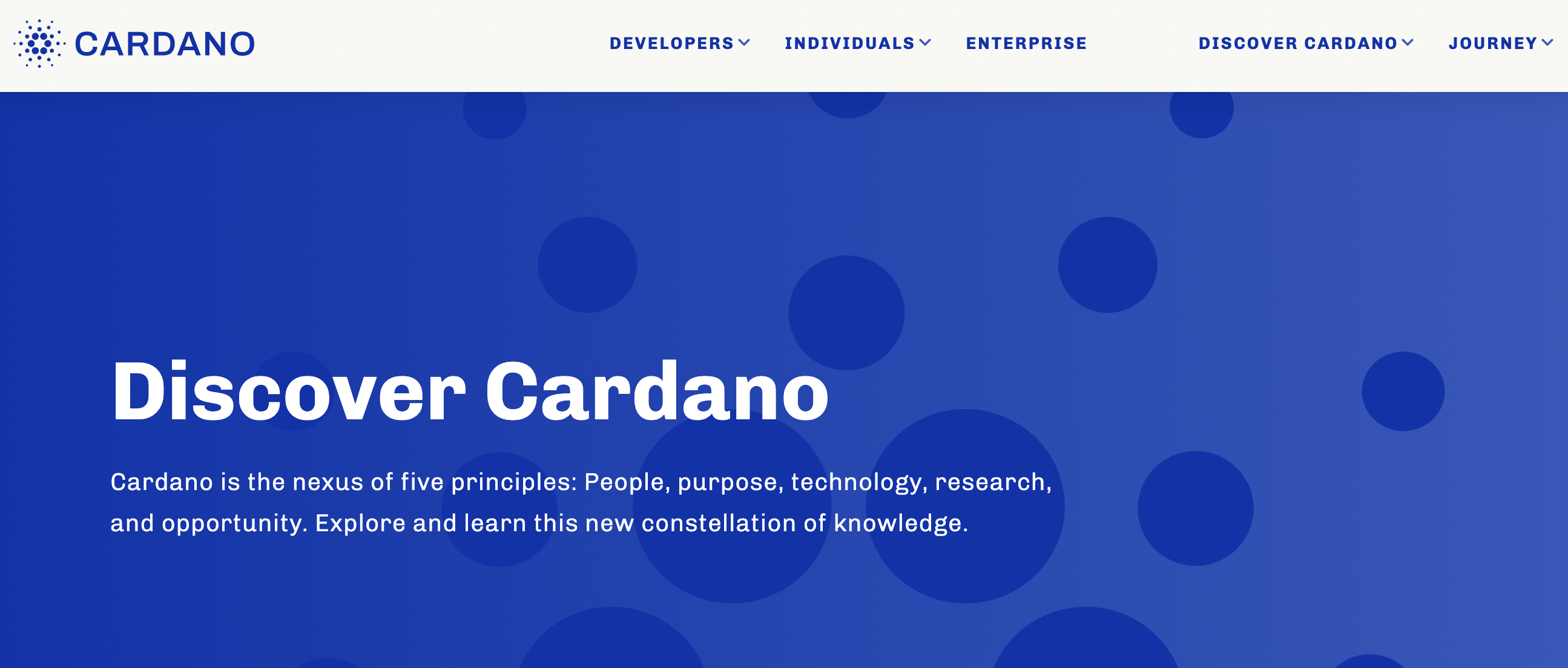
Those looking to actively access other features, such as staking, trading, or savings accounts - might be better suited for a software wallet. Options include a mobile app, desktop software, or browser extension.
Cardano investors should also consider whether they want responsibility for keeping the ADA tokens safe. If so, a non-custodial wallet gives users control of their private keys. While custodial wallets do not share private keys with investors, as the provider is responsible for security.
We discuss all of these options throughout this guide, enabling investors to choose the best Cardano wallet for their needs.
Why Do You Need an ADA Wallet?
The only way to store, send, and receive ADA tokens is by having access to either a Cardano wallet or one of the best crypto wallets on the market. This is in addition to other core features, such as token swaps and staking.
Here's some more information about why Cardano investors need a suitable ADA wallet:
Store ADA
The primary purpose of a Cardano wallet is to store ADA tokens. After all, bad actors will look to steal cryptocurrencies when the opportunity arises.
As such, Cardano wallets ensure that investors keep their ADA tokens away from hackers. There are many ways to secure a Cardano wallet, including cold storage, two-factor authentication, and a password.
Send ADA
Cardano wallets allow investors to send ADA tokens to another location. Transactions on the Cardano blockchain are conducted on a wallet-to-wallet basis.
To send Cardano to another wallet, users need to supply the receiving address.
Receive ADA
Similarly, Cardano wallets also allow users to receive ADA tokens from another location. The user will need to provide the sender with their unique ADA wallet address.
Cardano transactions usually take just 20 seconds to process, making it one of the most efficient networks in the industry.
Trade ADA
While not available with all Cardano wallets, some providers enable users to trade ADA. The specifics will vary depending on the wallet.

For example, the eToro wallet operates alongside a regulated exchange. This enables users to buy, sell, and trade ADA tokens without leaving the wallet. This is also the case with Binance and Coinbase.
Trust Wallet allows users to connect to dApps. This enables users to swap ADA tokens without going through a centralized exchange.
Stake ADA
Cardano operates on the proof-of-stake mechanism. meaning that ADA tokens can be staked for passive income.
The best Cardano wallets come with an in-built staking tool. This means investors can store and earn ADA tokens simultaneously. Otherwise, the ADA tokens will sit idle - resulting in opportunity costs.
Best Cardano Wallets: Full Reviews
ADA investors should consider their objectives when selecting the best Cardano wallet.
To help clear the mist, we will now review the top Cardano wallets for 2023. Within each review, we cover features, fees, security, supported networks, and other important metrics.
1. Best Wallet - Access a User-Friendly DEX and Get Trading Insights with this Non-Custodial Wallet
At the top of our list for the best crypto wallets is Best Wallet. This newly launched wallet eliminates the need to connect your wallet with other Web3 applications. It is an all-in-one web3 wallet comprising a user-friendly decentralized exchange, token staking options, and offers market insights.
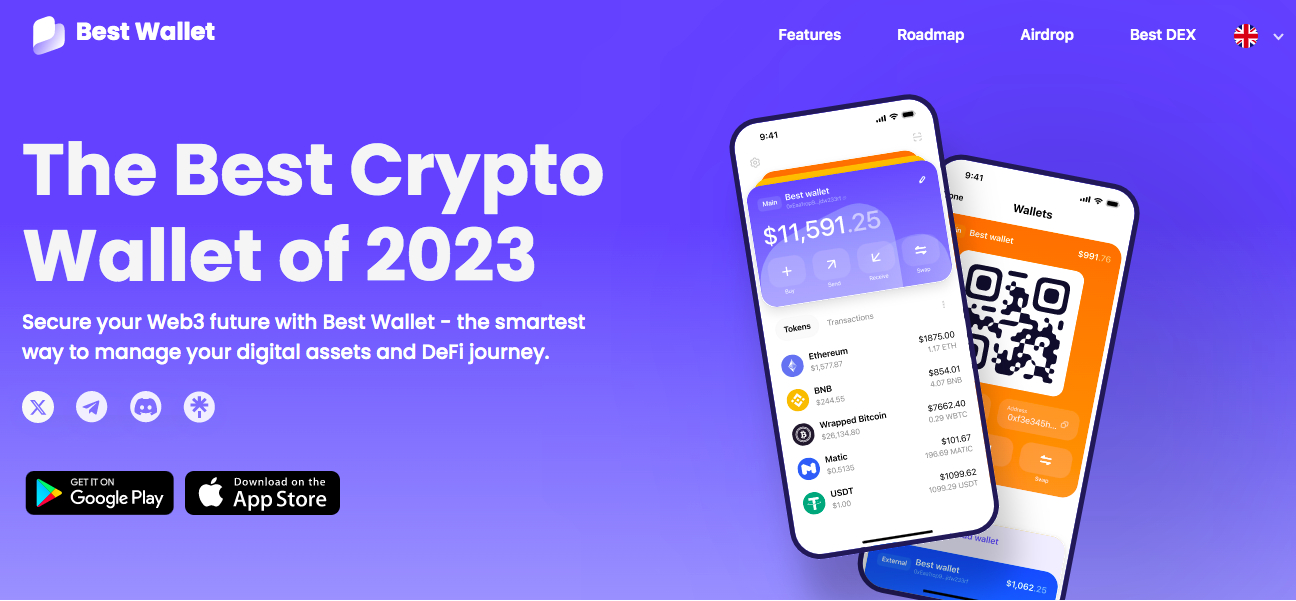
Currently, Best Wallet is compatible with the Ethereum, Polygon, and BSC mainnet, but may soon connect with other networks such as Bitcoin and Cardano. Through the Best wallet - users can connect all their other wallets and assets.
Users have complete custody over their assets and can access all their holdings with a private key. The wallet lets you access real-time trading insights and monitor market movements while also offering portfolio management options. Traders can stay informed with new token airdrops and crypto launches on the Best Wallet application.
The BEST ecosystem also features its own decentralized exchange - which is accessible without any registration process. The DEX connects you with the best liquidity pools to offer low-cost trades. Investors can also grab hold of $BEST - the native cryptocurrency, to get lower-cost trades on the DEX.
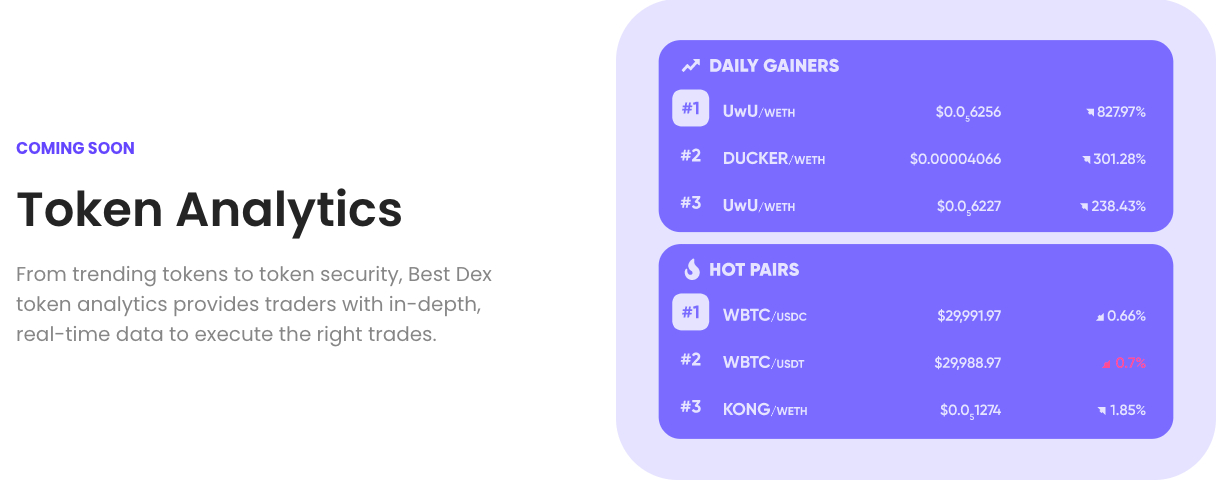
The platform roadmap has given us some key insights on the future use cases of the $BEST token. For instance, in the upcoming 5th roadmap phase, $BEST token holders will be able to stake their holdings and acquire access to new projects and zero gas fees.
By phase 4, Best Wallet will be NFT-compatible. The wallet will feature NFT sending options and allow users to store, receive, and trade NFTs on the ecosystem. The sixth and final phase will feature a $BEST token airdrop to reward loyal Best Wallet and DEX members.
Security features such as two-factor authentication (2FA) and advanced cryptographic security are implemented to keep the investor’s funds safe. Interested readers can download the Best Wallet application via iOS and Android.
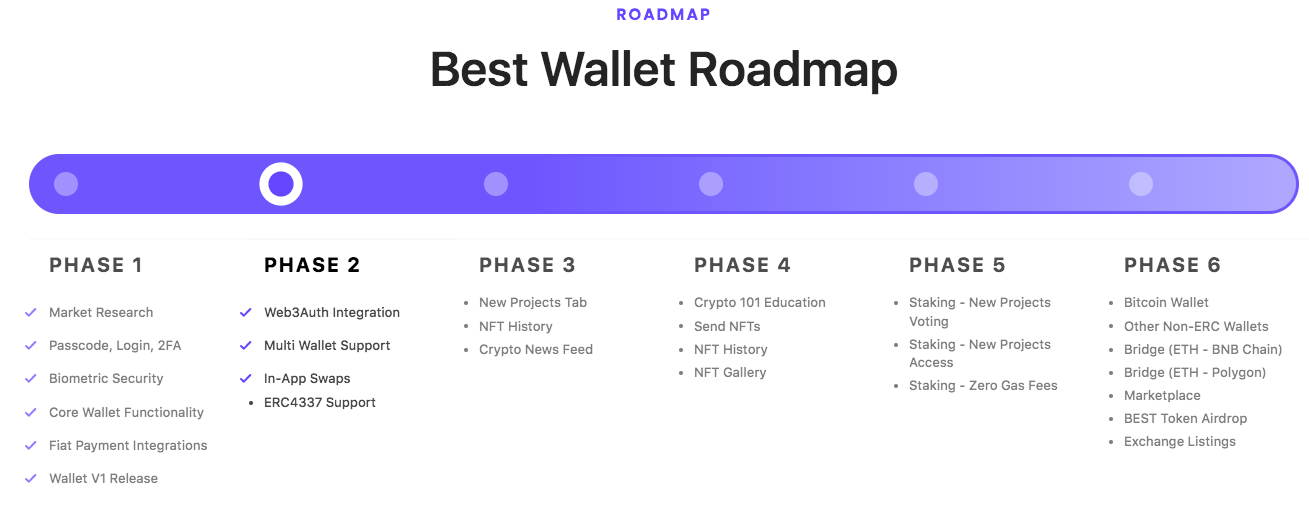
For more updates on this cryptocurrency wallet, join the Best Wallet Telegram channel and Discord.
| Type of ADA Wallet | Custodianship | Supported Coins | Fee to Buy ADA | App? | Staking/Interest? | Staking/Interest Rate |
| Mobile app | Non-custodial | Ethereum, Polygon, BNB, and other cryptos | Differs per the liquidity pool | Yes | Yes, will offer staking features for the $BEST token | N/A |
Pros
- Cross-chain compatible and non-custodial wallet
- Offers portfolio management options and token analytics
- Cheap trades through the Best decentralized exchange
- Will implement staking mechanism and NFT wallets in the future
- Trading discounts and zero gas fees with the $BEST token
Cons
- Not yet compatible with the Bitcoin network
Crypto assets are highly volatile investment products. Your capital is at risk.
2. eToro - Licensed Multi-Crypto Cardano Wallet
eToro is a custodial ADA wallet that is backed by a regulated brokerage. eToro holds licenses in multiple tier-one locations, including the US (FINRA), Australia (ASIC), the UK (FCA), and Cyprus (CySEC). What's more, eToro is used by over 30 million clients and was launched in 2007.
The eToro wallet comes as a mobile app or web interface. The latter offers seamless access to ADA tokens, as users simply need to log into their eToro account. In addition to two-factor authentication, eToro wallets are protected by cold storage. This offers the perfect blend between security, regulation, and convenience.

After all, the eToro wallet allows users to store, send, receive, and trade Cardano in one place. In fact, the wallet connects to the eToro exchange - which supports dozens of cryptocurrencies. This includes everything from Cardano, Bitcoin, and Shiba Inu to Aave, Ethereum, and Dogecoin. Commissions amount to 1% per slide, and the minimum trade size is just $10.
We also like that the eToro wallet comes with staking tools. This supports Cardano, Tron, and Ethereum 2.0. Investors will receive up to 90% of their ADA staking rewards, and there is no lock-up period. There is no requirement to opt-in for staking, as this happens automatically after 10 days of holding ADA in the eToro wallet.
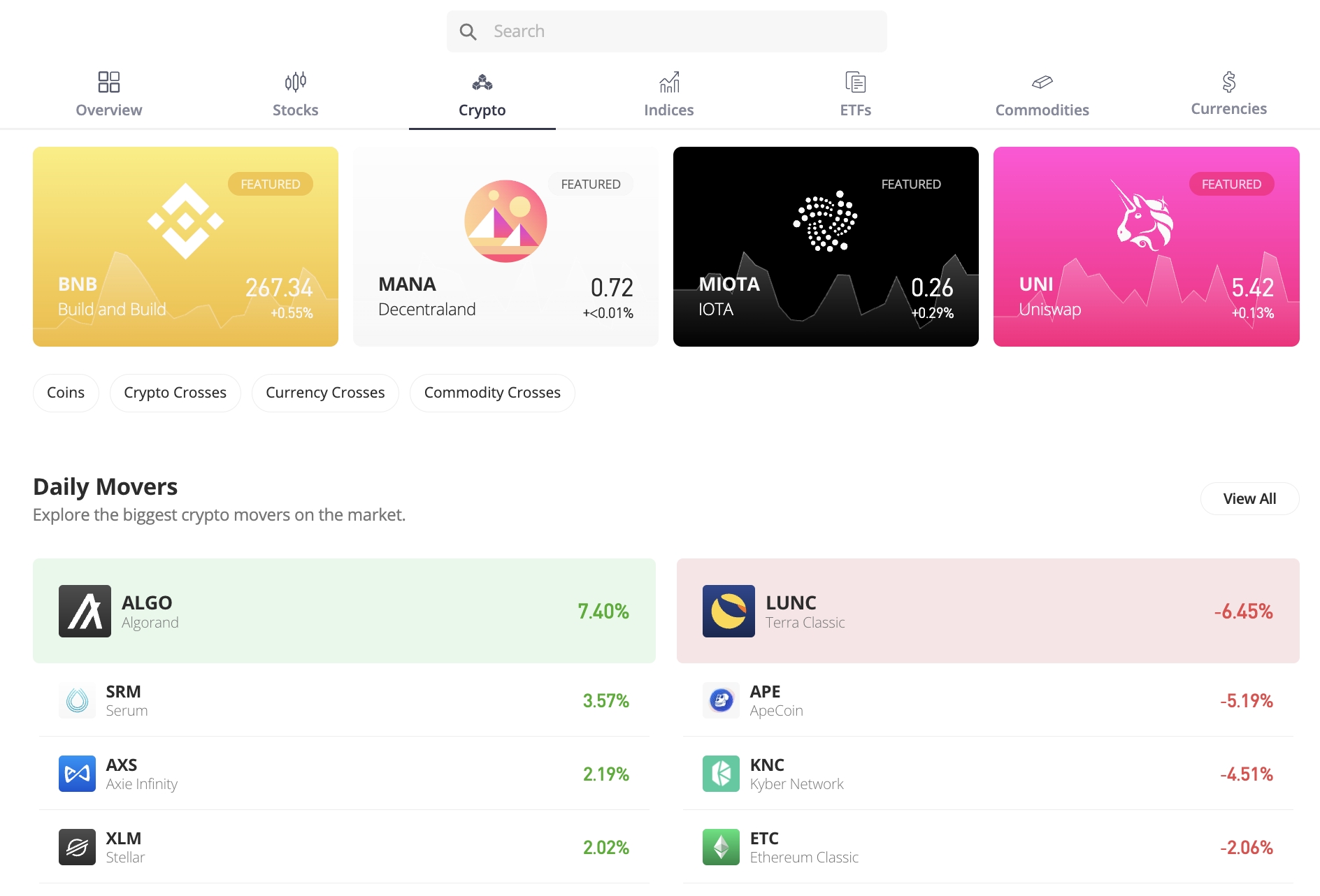
Another feature that eToro users have access to is copy trading. This is a passive investment tool that allows users to select and copy an experienced trader. All buy and sell orders made by the selected trader will be replicated in the user's account. eToro also supports professionally managed crypto portfolios, so its wallet ecosystem covers all bases.
That said, we should note that users will need to download the eToro wallet app should they wish to send and receive ADA. This feature is not available in the main eToro web wallet. Nonetheless, the eToro app comes with plenty of other features, including token swaps for over 500 pairs. This makes it seamless to trade ADA tokens without leaving the wallet interface.

In terms of fees, both the eToro web and mobile wallets are free to use. Outgoing transactions from the mobile wallet are charged at the Cardano blockchain rate. However, there is a 2% fee to transfer ADA from the web wallet to the mobile app. Those looking to buy Cardano with a debit/credit card or e-wallet will pay just 0% (US clients) or 0.5% (non-US clients).
| Type of ADA Wallet | Custodianship | Supported Coins | Fee to Buy ADA | App? | Staking/Interest? | Staking/Interest Rate |
| Web wallet and mobile app | Custodial | 90+ cryptocurrencies, including Cardano, Bitcoin, Dogecoin, Ethereum, BNB, and XRP | 1% trading commission. No fees to deposit USD. Non-USD deposits cost 0.5%. | Yes | Yes, supports Cardano staking without lock-up terms | Distributes up to 90% of the Cardano staking rewards generated |
Pros
- Stake ADA tokens without needing to opt-in
- Access a regulated exchange that supports over 90 cryptocurrencies
- Rock-solid security - including cold storage and two-factor authentication
- Passive trade ADA and other cryptocurrencies via copy trading
- One of the most user-friendly Cardano wallets in the market
Cons
- KYC process required to access the wallet
- 2% fee to transfer ADA to the eToro wallet app
Crypto assets are highly volatile investment products. Your capital is at risk.
3. Trust Wallet - Non-Custodial ADA Wallet Supporting Over 4.5 Million Digital Assets
Trust Wallet is one of the best ADA wallets for diversified portfolios. Not only does it support ADA but over 4.5 million other digital assets. This covers cryptocurrencies and NFTs on over 70 blockchains, ranging from Cardano, Ethereum, and Binance Smart Chain to Bitcoin and XRP. This also includes some of the best meme coins, like Shiba Inu, Dogecoin, Pepe, and Tamadoge.
Trust Wallet is a non-custodial option, so users control their private keys. What's more, private keys are easily managed via a 12-word passphrase. Only the user that created the wallet can access its credentials, meaning Trust Wallet is 100% decentralized. We also like that Trust Wallet allows users to stake ADA tokens. This can be achieved within the Trust App and simply requires a deposit of 4 ADA.

Trust Wallet notes that the entire ADA balance will be staked, but the tokens are never locked. As such, users can unstake their ADA at any time. Trust Wallet also supports other staking coins, including BNB, Tron, Algorand, and Cosmos. We also found that Trust Wallet supports in-app token swaps.
This comes with cross-chain functionality, meaning ADA can be swapped for cryptocurrencies on other networks. Trust Wallet does not charge fees for staking or swapping ADA tokens. The wallet does, however, charge fees when buying cryptocurrencies with a debit/credit card. The service is provided by Simplex, so users should expect to pay up to 5% at a minimum of $10.
| Type of ADA Wallet | Custodianship | Supported Coins | Fee to Buy ADA | App? | Staking/Interest? | Staking/Interest Rate |
| Browser extension and mobile app | Non-custodial | 4.5 million cryptocurrencies and NFTs across 70 blockchain networks | Up to 5%, as transactions are processed by Simplex | Yes | Yes, supports a selection of the best staking coins, including Cardano | Not stated - will depend on the Cardano network |
Pros
- Best Cardano wallet for non-custodial storage
- Comes as an iOS/Android app and a Chrome browser extension
- No fees to store, receive, stake, or swap ADA tokens
- Supports 4.5 million cryptocurrencies and NFTs
Cons
- Pay up to 5% to buy cryptocurrencies with a debit/credit card
- No browser extension for Firefox or Edge
- No desktop software
4. Trezor - Hardware Wallet for Storing Cardano Offline
Security-conscious investors might consider Trezor the best Cardano wallet for safety. Trezor offers two hardware devices to choose from - each of which remains in cold storage at all times. And hence, the ADA tokens are never exposed to online vulnerabilities, like hacking attempts. First, there is the Trezor Model One. This is the basic model that retails for $69.
Alternatively, there is the Trezor Model T, which retails for $219. In reality, both come with the same security features. For example, both the Model One and T encrypt the user's private keys within the device. Moreover, Cardano transfers are only authorized via a PIN. This needs to be entered on the device.

That said, the Model T comes with the ability to stake ADA tokens. This option is not available on the Model One. Furthermore, the Model T comes with a touchscreen, making it easier to process transactions. The Model T also supports USB type-C connections. While the Model One is compatible with type-A.
Nonetheless, both Trezor models offer rock-solid security features and are suitable for long-term investors. Those buying a device will also have access to the Trezor Suite. This is a mobile app and desktop software for managing transactions and swapping tokens. But do remember that no ADA movements are possible unless the PIN is entered on the device.
| Type of ADA Wallet | Custodianship | Supported Coins | Fee to Buy ADA | App? | Staking/Interest? | Staking/Interest Rate |
| Hardware wallet | Non-custodial | Approximately 1,200-1,400 - depending on the chosen model | Fiat payments go through Invity, which connects users to a third-party exchange. Fees will vary. | Yes | Yes, but only on the Trezor Model T | Not stated - will depend on the Cardano network |
Pros
- Best wallet for Cardano investors with long-term goals
- Offline storage ensures the ADA tokens are never exposed to the internet
- Great for diversified portfolios - supports dozens of network standards
- The entry-level model costs just $69
Cons
- Staking is only available on the Model T - which retails for $219
- Transactions must be confirmed on the device - which won't be suitable for active traders
5. Exodus - Mobile and Desktop Wallet With Self-Custody Storage
Exodus is one of the best Cardano wallets for self-custody storage. This is because Exodus provides users with their private keys, which are encrypted on the device. In turn, Exodus, nor any other party, has access to the wallet. Exodus supports smartphones and desktop devices. The latter includes Windows and Mac. While the former includes iOS and Android.
Exodus not only comes pre-loaded with support for Cardano but 260 other cryptocurrencies. The wallet supports plenty of network standards, allowing users to add their own custom tokens. We also like that Exodus stores NFTs and provides access to the decentralized web. For example, users can easily connect to dApps like OpenSea, Yearn.finance, and SushiSwap.

Exodus is also one of the best ADA wallets for beginners. The wallet interface is very user-friendly, and all functionalities are clearly displayed. For example, clicking on the 'Staking' button allows users to stake ADA in seconds. Currently, ADA can be staked at an APY of 3.5%. There is no lock-up term, so users are free to unstake the tokens at any time.
Exodus also supports in-app token swaps. This service is facilitated by third-party crypto exchanges, and Exodus adds an unspecified spread. Users will also need to pay fees when buying Cardano and other cryptocurrencies with fiat money. This is charged at up to 5.45%, depending on the payment type and currency.
| Type of ADA Wallet | Custodianship | Supported Coins | Fee to Buy ADA | App? | Staking/Interest? | Staking/Interest Rate |
| Desktop software and a mobile app | Non-custodial | Initially comes pre-loaded with 260 cryptocurrencies. But custom tokens can be added on any supported blockchain, including Cardano, Ethereum, and Binance Smart Chain | Fiat payments go through a third party and can cost up to 5.45%, depending on the payment type and currency | Yes | Yes, in-built staking tool | 3.5% on ADA |
Pros
- Earn passive ADA staking rewards of 3.5%
- User-friendly dashboard for management investments
- No fees to store and receive ADA
- No markups on GAS fees
Cons
- High fees to buy Cardano with fiat money - up to 5.45%
- Token swaps come with a markup - which is built into the exchange rate
6. Coinbase - Custodial Cardano Wallet With Solid Security Tools
Coinbase is the best Cardano wallet for beginners seeking custodial storage. By depositing ADA tokens into the Coinbase wallet, users are protected by IP and device whitelisting, as well as two-factor authentication. Users can also set a time lock on withdrawals. This freezes withdrawal requests for 24-48 hours, giving users time to act on unauthorized transfers.
Internally, Coinbase has a 24/7 security team and keeps 98% of client assets in cold storage. Moreover, all Coinbase users must go through a KYC process. Not only is Coinbase one of the safest custodial wallets for ADA, but also one of the most convenient. It comes as a mobile app or web wallet, both connecting to the same account.
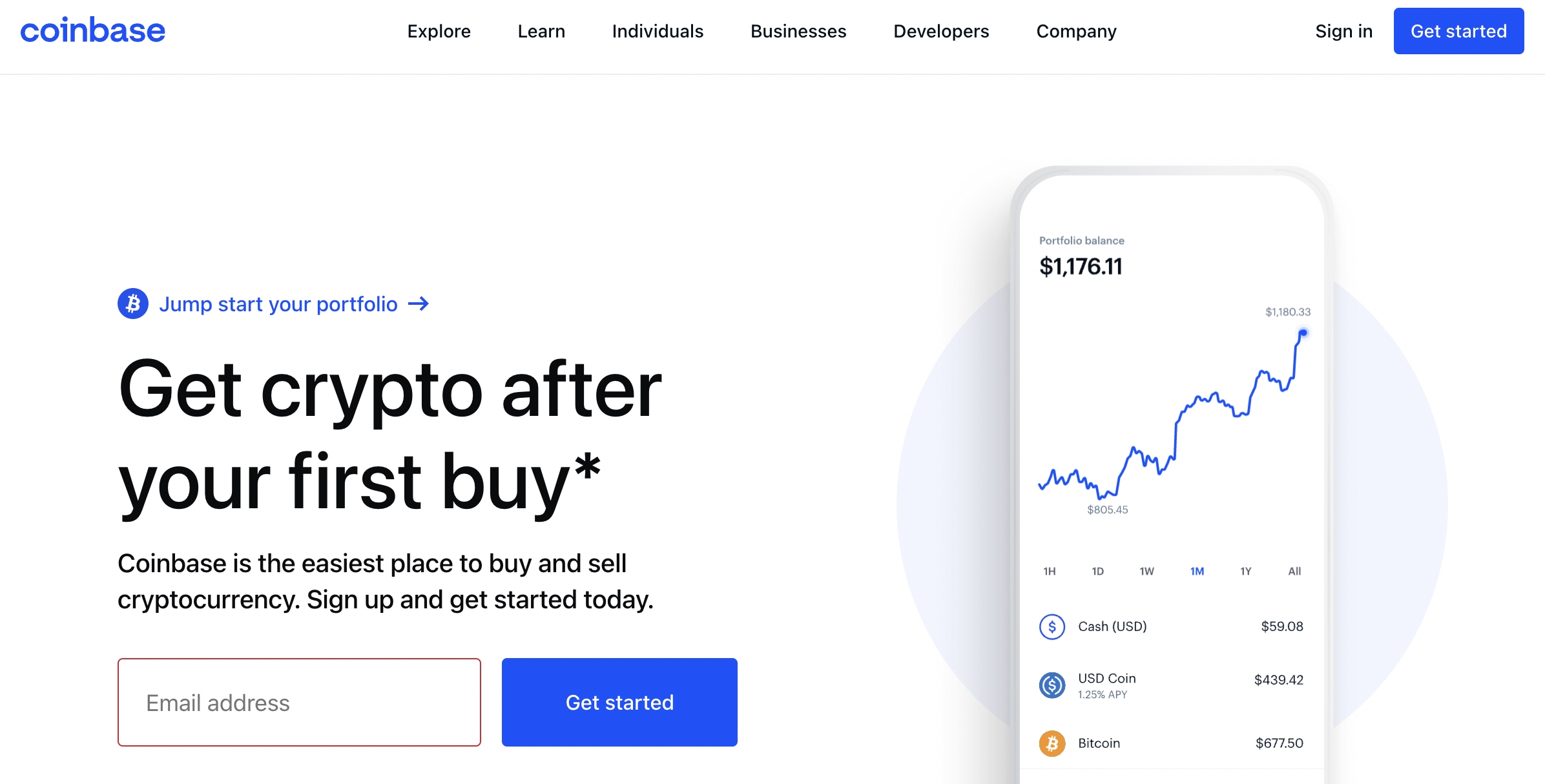
Moreover, the Coinbase wallet allows users to trade Cardano at the click of a button. This is in addition to over 100 other cryptocurrencies. That said, users will pay 1.49% on each buy-and-sell order. If the order is valued at under $200, a flat fee is paid. Another drawback is that fiat payments are charged 3.99%.
| Type of ADA Wallet | Custodianship | Supported Coins | Fee to Buy ADA | App? | Staking/Interest? | Staking/Interest Rate |
| Web wallet and a mobile app | Custodial | Over 100 cryptocurrencies, including Cardano, Bitcoin, Ethereum, and Dogecoin | 1.49% to exchange cryptocurrencies. 3.99% to buy Cardano with fiat money | Yes | Yes, supports Cardano and 93 other staking coins | 2% on ADA |
Pros
- One of the best Cardano wallets for beginners
- Custodial storage backed by cold wallets and two-factor authentication
- Stake Cardano and 93 other PoS coins
- Available as a web wallet or mobile app
Cons
- Debit/credit cards attract a fee of 3.99%
- Takes up to 35% of staking rewards
- Pays just 2% on ADA staking
7. Binance - Store, Trade, and Earn Cardano Under One Roof
Binance is another popular option for ADA investors. This exchange - which charges just 0.1% to trade cryptocurrencies, offers a web and mobile wallet. Both are custodial and connect to the same account. The Binance wallet is built into its spot trading exchange, allowing users to store and trade Cardano under one roof.
While the Binance wallet is custodial, it comes with a range of security features. This includes cold storage, two-factor authentication, and device whitelisting. Two-factor authentication is often required on both a smartphone and email confirmation link. The Binance wallet also comes with an insurance fund known as 'SAFU'.

This is funded by exchange commissions and is in place to compensate users in the event of a hack. That said, the balance of SAFU is not publicly available. Nonetheless, the Binance wallet offers plenty of ways to earn interest on ADA investments. This includes savings accounts with APYs of up to 3.9%. To get the highest yield, ADA needs to be locked for 120 days.
| Type of ADA Wallet | Custodianship | Supported Coins | Fee to Buy ADA | App? | Staking/Interest? | Staking/Interest Rate |
| Web wallet and a mobile app | Custodial | Over 350 cryptocurrencies, including Cardano, XRP, USDT, and Bitcoin | 0.1% to exchange cryptocurrencies. Fiat payment fees depend on the country of residence and payment type. | Yes | Yes, offers ADA savings accounts. Terms vary from 0 to 120 days. | Up to 3.9% on ADA |
Pros
- Earn up to 3.9% when transferring ADA to a savings account
- Easily store and trade ADA under one roof
- Comes as a web wallet and mobile app
- Supports over 350 cryptocurrencies, including some of the best altcoins
Cons
- Staking tool does not support ADA
- The Binance exchange was hacked in 2022
8. Ledger - Keep Cardano in Cold Storage From Just $79
Ledger is one of the most popular Cardano hardware wallets in the market and a great option for long-term investors. This is a non-custodial wallet that encrypts private keys in the device. When setting Ledger up, the 24-word passphrase is displayed on the device's screen. This recovers the wallet if the PIN is forgotten or the device is misplaced.
The entry-level model - the Ledger Nano S Plus, retails for just $79. This supports over 5,000 cryptocurrencies - including Cardano and many of the best utility tokens. Ledger also allows users to add custom tokens on any supported network. Ledger is also one of the best Cardano wallets for staking. The wallet connects to AdaLite, which stakes ADA tokens at a fee of just 3%.

While ADA is being staked, the wallet remains offline at all times. We also like Ledger Live, which allows users to manage their investments on a smartphone or desktop device. This is compatible with iOS, Android, Windows, Linux, and Mac. Ledger Live supports token swaps and fiat payments, but fees are determined by third parties.
| Type of ADA Wallet | Custodianship | Supported Coins | Fee to Buy ADA | App? | Staking/Interest? | Staking/Interest Rate |
| Hardware wallet | Non-custodial | Over 5,000 cryptocurrencies, including Cardano, BNB, Ethereum, and Bitcoin | Fiat payments go through Coinify, which has its own pricing structure | Yes | Yes, provided by AdaLite - which charges 3% fees | Not stated - will depend on the Cardano network |
Pros
- Keep ADA tokens in cold storage for just $79
- The private keys and ADA tokens are never exposed to live servers
- Supports more than 5,000 other cryptocurrencies
- Staking is provided by AdaLite - which charges just 3%
Cons
- Its latest model - Stax, retails for $279
- Is not transparent with token swap fees
9. Daedalus - Open-Sourced Cardano Wallet for Advanced Users
Daedalus is one of the best Cardano wallets for advanced users. This is a full-node wallet that connects directly to the Cardano network. As such, not only will this require premium device storage but continuous updates. This is because all Cardano transactions are stored within the wallet interface.
The benefit of this is increased efficiency, as transactions do not go through third parties. Moreover, Daedalus allows users to become delegators, meaning they can stake ADA tokens directly. This removes the need to pay fees to a third-party staking pool. That said, Daedalus is far from user-friendly.

In fact, this Cardano wallet should only be considered by experienced blockchain users. Daedalus supports multiple operating systems, including Windows, Mac, and Linux. Moreover, the underlying software is open-sourced. This ensures that the wallet comes with water-tight security and that vulnerabilities are fixed quickly.
| Type of ADA Wallet | Custodianship | Supported Coins | Fee to Buy ADA | App? | Staking/Interest? | Staking/Interest Rate |
| Desktop wallet | Non-custodial | Cardano | N/A | No | Yes, allows users to become validators - so staking goes directly through the Cardano network | As per the Cardano network |
Pros
- Best ADA wallet for advanced users
- Open-sourced - so bugs and vulnerabilities are quickly resolved
- Supported by Windows, Mac, and Linux
- Allows users to stake ADA as full network validators
Cons
- Not suitable for beginners
- Requires a significant amount of desktop storage
- Does not support trading or token swaps
Best ADA Wallets: Our Ranking Criteria
The best Cardano wallets discussed on this page offer varying levels of security and convenience. When ranking the top providers, we consider safety, usability, fees, supported networks, staking features, and more.
There is a Cardano wallet to suit all investment goals. But which wallet is best?
Below, we explain how we ranked the best ADA wallets for 2023:
- Custodianship: We covered a blend of custodial and non-custodial wallets. This enables Cardano investors to decide who should be responsible for keeping the ADA tokens secure. Put simply, while non-custodial wallets share private keys with the user, this isn't the case with custodial wallets.
- Fees: Most Cardano wallets are free, other than hardware devices. For example, Trezor and Ledger charge $69 and $79, respectively. We also consider Cardano wallet fees linked to transactions, staking, and trading.
- Wallet Type: Cardano investors should also consider what divide they want to store the wallet. Beginners often go with a mobile or web wallet, as this offers a good balance between security and convenience. While experienced investors might consider a Cardano desktop wallet like Daedalus.
- Supported Coins: Some Cardano investors will also hold other cryptocurrencies. In this instance, the best Cardano wallets include eToro and Trust Wallet, which support plenty of blockchain networks.
- Security: It is also important to assess how secure the Cardano wallet is. Look for features like cold storage, multi-sig permissions, wallet address whitelisting, and two-factor authentication.
Ultimately, a number of Cardano wallets are aimed at active traders that want access to features like staking and token swaps. While others are focused on enhanced security, which comes at the expense of convenience.
How do ADA Wallets Work? The Basics
All ADA wallets come with basic functions that allow users to engage with the Cardano network. This includes storing, sending, and receiving ADA tokens. Cardano wallets are available as both software and hardware.
Software wallets are compatible with smartphones, desktops, and web browsers. While hardware wallets come as physical devices. Regardless of the device type, Cardano wallets give users a unique public address. This is required to receive ADA tokens from another person.

And when sending ADA, the user needs the receiver's public address. Wallet-to-wallet transactions are relatively simple, but users should ensure that mistakes are avoided. This is because sending ADA tokens to the wrong address will result in a loss of funds.
Another feature of Cardano wallets is they come with private keys. This provides access to the wallet from any device. Private keys should only be used if the user forgets their wallet password or loses the device. Never store private keys online, as this exposes them to remote hacking attempts.
Some Cardano wallets also allow users to stake ADA, meaning passive rewards. This is usually in the 2-5% APY region, depending on the wallet provider. Moreover, Cardano wallets like eToro and Binance support trading. This means users can buy and sell Cardano without needing to transfer tokens to another platform.
Different Types of ADA Wallets
There are many ADA wallet types to choose from - ranging from a mobile app and hardware device to browser extensions and desktop software.
Investors can read on to choose the best Cardano wallet type for their goals.
Cardano Software Wallets
Cardano software wallets are usually free and allow users to perform a range of functions. This includes seamless transfers, token swaps, and staking. All without needing to leave the wallet interface.
One option is to download a Cardano wallet app, such as eToro or Trust Wallet. These wallets are secured by a password/PIN. Alternatively, some investors prefer desktop software. This allows users to manage their ADA tokens on a larger screen
Other software options include web wallets and browser extensions.
Cardano Hardware Wallets
Large-scale investors with huge exposure to Cardano should consider a hardware wallet.
- The private keys are encrypted on the hardware device
- The ADA tokens are always offline, alleviating the risk of being hacked
- ADA transfers must be confirmed by entering a PIN on the device
The price of a hardware wallet will vary considerably depending on the provider and model. The Trezor Model One - at $69, is a great option,
Cardano Paper Wallets
Cardano paper wallets allow ADA holders to keep their tokens offline. But instead of the private keys being stored in a device, they are printed or written onto a sheet of paper.
- First, choose a reputable platform that can generate Cardano wallet addresses and private keys
- Next, transfer the ADA tokens to the generated wallet address
- Then, print the wallet address and private keys
- Keep the printed paper somewhere safe
Naturally, it is impossible for Cardano paper wallets to get hacked, as the private keys are never online. The main risk is if the paper wallet is damaged or ends up in the wrong hands.
Cardano paper wallets can be imported into selected software wallets via the private keys.
How Safe Are Cardano Wallets?
Cardano wallets are generally considered safe. But the level of security will vary widely depending on the wallet type.
For example, custodial wallets do not provide users with their private keys. At the very least, this means that the user is not responsible for protecting the private keys from hackers. Leading custodial wallets like eToro and Binance offer two-factor authentication.
This means the user needs to confirm their mobile number before being able to access the wallet. eToro and Binance also keep most client-owned cryptocurrencies in cold storage. But of course, if a custodial wallet provider is hacked, the ADA tokens are at risk.

The safety of a non-custodial wallet depends on the device type. For example, hardware wallets keep 100% of the ADA tokens in cold storage. Moreover, transactions can only be authorized on the device. This requires the user's PIN.
Non-custodial software wallets are less secure. Typically, these are protected by a password or PIN - and the private keys are always vulnerable to hackers.
All of these factors should be considered when choosing the best Cardano wallet.
How to Set up an ADA Wallet?
Setting up an ADA wallet usually only takes a couple of minutes. But the specific process will vary depending on the wallet type, provider, and device.
Below, we explain how to get started with the Best Wallet app, which is available on both iOS and Android.
Step 1: Download the Best Wallet App
The first step is to use your respective Android or iOS devices and search for Best Wallet on the App Store. Click on ‘Download’ and get the app free of cost.
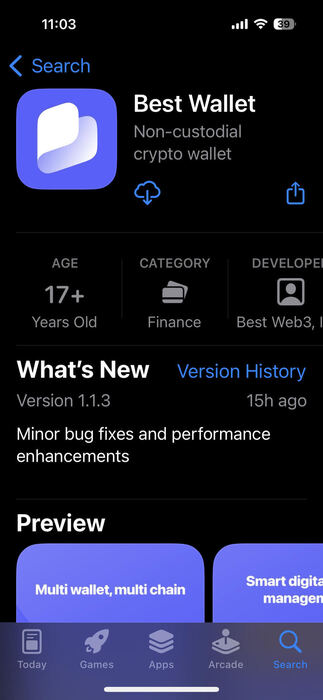
Step 2: Registration Process
Once you open the application, you can start by registering a new account. Enter your email address manually, or select the ‘Continue with Apple/Google’ button - a faster alternative since the device will automatically enter your email address.
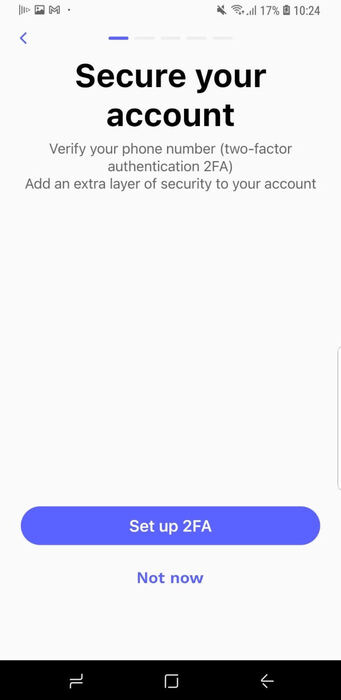
Step 3: Complete Security Requirements
Each user must enter a four-digit passcode/PIN to access their crypto wallet. A fingerprint option is also accessible to wallet users.
Best Wallet users can leverage the 2FA verification process to add an extra layer of security while logging into the application.
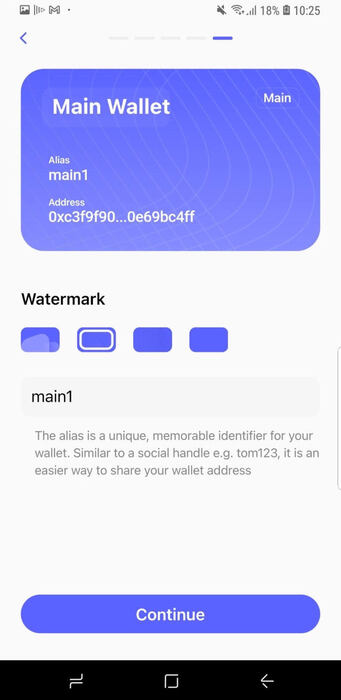
Step 4: Browse Best Wallet
Once the registration and security is completed, Best Wallet users can avail of the wallet’s features. Trade multiple crypto tokens, access trades from the best liquidity pools, and gain market trading insights.
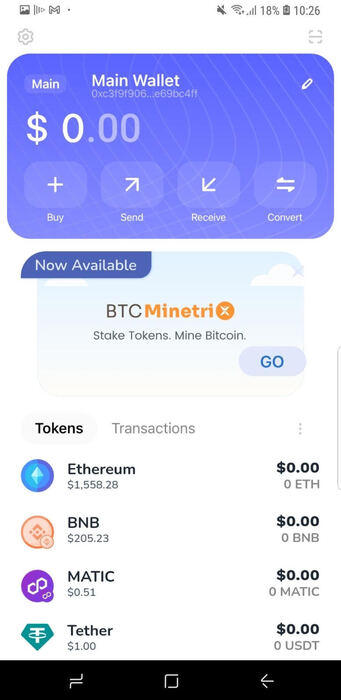
The Verdict
We have reviewed and ranked the best Cardano wallets for 2023, ensuring that there is an option for all experience levels and objectives.
That said, we found that the Best wallet is the overall best option. This is a new cryptocurrency wallet that offers several web3 features under the same roof. Users can access all their crypto wallets and assets with Best Wallet - and will be able to trade NFTs, stake tokens, and win $BEST token airdrops in the future.
References
https://coinmarketcap.com/rankings/exchanges
https://docs.cardano.org/explore-cardano/time/
https://www.mckinsey.com/featured-insights/mckinsey-explainers/what-is-proof-of-stake
https://support.simplex.com/hc/en-gb/articles/360014078420-What-fees-do-you-charge-for-card-payments
https://support.dfinity.org/hc/en-us/articles/360057133012-What-is-Self-Custody
https://www.swift.com/your-needs/financial-crime-cyber-security/know-your-customer-kyc/kyc-process
https://academy.binance.com/en/glossary/secure-asset-fund-for-users
https://www.theguardian.com/technology/2022/oct/07/binance-crypto-hack-suspended-operations
https://shop.ledger.com/pages/hardware-wallets-comparison
https://corporate.coinify.com/fees-and-limits
FAQs
Where is the best place to store ADA Cardano?
The best place to store Cardano is Best Wallet - a non-custodial wallet that offers its own DEX, trading insights, and staking features.
What is the best wallet for staking Cardano?
One of the best wallets is Best Wallet - a non-custodial cross-chain compatible Web3 wallet. Users can access the wallet to gain market and trading insights, and get discounts by holding the $BEST token.
How do I keep my Cardano safe?
Choosing a reputable wallet is the best way to keep Cardano safe - so look for providers offering two-factor authentication, multi-sig permissions, and other security features.
Which wallets allow you to buy Cardano?
The best wallet to buy Cardano is eToro - a regulated provider that supports debit/credit card payments from 0%.

